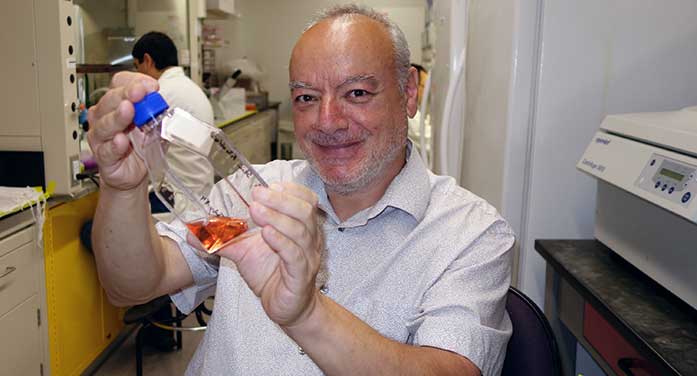
Hasan Uludag holds a sample of leukemia cells treated with experimental drugs his team is testing that fight blood cancers by targeting gene defects in blood cells. (Photo: Geoff McMaster)
A University of Alberta researcher is hot on the trail of a new drug to combat blood cancers.
Based on RNA technology — best known for the Pfizer and Moderna COVID-19 vaccines — the drug targets specific gene defects in blood cells responsible for cancers such as leukemia.
“With conventional cancer drugs, there is a disconnect between the drug and the gene defect,” says Hasan Uludag of the Department of Chemical & Materials Engineering.
When something goes wrong with a gene, it releases a defective messenger molecule called mRNA that triggers the production of a cancerous protein. Predicting the protein’s three-dimensional structure and how to inhibit it with a conventional drug is “almost like guesswork,” says Uludag.
Instead, his team goes after the defective mRNA molecule – easy to predict how to eradicate it when you know the sequence of the gene defect.
|
Related Stories |

|
| New treatment for blood cancer developed
|
| Promising chemotherapy treatment for bladder cancer enters human trials
|
| Radon: the silent killer lurking in your home
|
“Tell me the genetic defect, and I will tell you the mRNA,” he says. “Without going to the protein, I can actually devise a method to destroy that mRNA. Once you stop the mRNA, there is no protein coming down the road. It neutralizes any harmful effect causing cancer.”
To disable the mRNA, Uludag targets it with nucleic acids called short interfering RNAi— siRNA in their pharmacological form. Uludag’s innovation, however, is the nanoparticles or lipopolymers that package and carry the interfering nucleic acids into blood cells.
“Our specialty is mixing the nucleic acids with the right lipopolymers to make nanoparticles that enter the cells,” he says, adding that his team is the leading group in the world pursuing this particular application of the technology.
Uludag and his team have been engineering lipopolymers designed for blood cells for about 12 years. The research is about two years away from clinical trials and five years away from commercialization.
He has also formed a spinoff company and has begun talks with pharmaceutical companies to get his new drug to market.
“We want to do this as quickly as possible – I don’t want to waste time,” he says. “There are patients dying because of this cancer.”
Uludag’s siRNA technology is best suited to treating acute myeloid leukemia, the most common variant of a blood disease often caused by gene defects.
For blood cancers that aren’t caused by gene defects, however, it remains an “open question” whether the technology could be of use, he says.
“That’s not something we are working on. But because we are designing these carriers, other researchers could test them to see if they work with molecules associated with other types of blood cancers.”
Uludag added that his lipopolymers might need to be tweaked depending on the type of blood cancer being treated.
He says there are currently no RNA drugs for blood cancers, but the global market is estimated at about $33 billion.
| By Geoff McMaster
Geoff is a reporter with the University of Alberta’s Folio online magazine. The University of Alberta is a Troy Media Editorial Content Provider Partner.
The opinions expressed by our columnists and contributors are theirs alone and do not inherently or expressly reflect the views of our publication.
© Troy Media
Troy Media is an editorial content provider to media outlets and its own hosted community news outlets across Canada.

